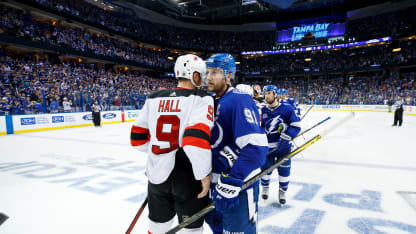In defeating the Devils four games to one, the Lightning delivered a magnificent first round performance. Obviously, there were several components that went into the triumph - and we will examine those in this column. But first, a reminder about two important questions for the Lightning that were detailed before the series began. First, could the Lightning neutralize New Jersey's team speed, led by Taylor Hall? The Devils' speed created problems for the Lightning at points during the regular season series. Second, would the Lightning's penalty kill, which struggled during the second half of the regular season, be able to handle a New Jersey power play that finished the regular season with 16 goals in the final 19 games? The answer to both those questions turned out to be "yes". Here's how the Lightning did it, along with other critical factors that went into their series victory.
Mishkin's Musings: How the Lightning beat the Devils
Lightning broadcaster Dave Mishkin takes a look at what went right for Tampa Bay in its series victory over New Jersey

© Scott Audette
Team Defense and Team Speed: At first glance, these two areas may not seem to be related to one another. But the fact is that, when the Lightning are on their game, these two components fit together like two puzzle pieces. The Lightning's team defense in the series was outstanding. They limited New Jersey's time and space in the Tampa Bay zone. Their strong gap control prevented the Devils from using that vaunted team speed to accelerate up the ice. They blocked shots and cleared rebounds. Their positional play was spot-on. But team defense isn't just limited to play without the puck. The Lightning's sound puck management allowed them to exit their own end efficiently - or, if no clean passing play was available, to just chip it out safely. They avoided turnovers, particularly those in high-risk areas of the ice. Their excellent work with and without the puck allowed them to own lots of puck possession during five-on-five play. That possession time fed into their speed game. Because the Lightning moved the puck out of their own end cleanly, they were able to press the attack on New Jersey. Sometimes, they carried the puck into the New Jersey end. Other times, they dumped it in and pursued on the forecheck, often successfully forcing the Devils into a d-zone turnover. Their speed game, both off the rush and on the forecheck, yielded several important goals, such as the Ondrej Palat's opening goal in Game One (forecheck), J.T. Miller's tally in the first period of Game Four (off the rush) and Mikhail Sergachev's goal in Game Five (forecheck). Also significantly, the Lightning's speed game forced the Devils to play defense - and kept them off the attack. This ultimately helped the Lightning's defensive game.
There were three notable segments during the series when the Devils were able to reverse the puck possession script. The final 10 minutes of the second period in Game One, the last 10 minutes of the third period in Game Two and, thanks to four power play opportunities, much of the third period in Game Three. Even during those stretches, though, the Lightning hung in there defensively and did well to limit New Jersey's Grade-A chances.
But those three were outlier segments. For the vast majority of the series, the Lightning were able to dictate action with tight team defense and speedy play. That combination, among other things, effectively neutralized New Jersey's dangerous speed game. This high-level performance was team-wide throughout the Lightning lineup. Everybody contributed to the effort.
Taylor Hall: Hall did get his points in this series, posting two goals and five assists during the five games. Taking out the two empty-netters New Jersey scored in Game Three, Hall had a hand in seven of the Devils' 10 goals scored in the series. But outside of Hall's performance in Game Three, the Lightning did a good job of not letting him dominate play. Whenever possible, the Lightning matched their forward line of Brayden Point, Tyler Johnson and Palat against Hall's line. The two defensemen were Anton Stralman and Ryan McDonagh. With the benefit of the last change during the three games at Amalie Arena, the Lightning were able to get this matchup more frequently. Those five deserve credit for how well they did to contain New Jersey's most prolific scorer. But so do the others who also drew assignments against Hall. As much as they could, the Lightning forced Hall to play defense in the New Jersey end. When Hall had the puck, the Lightning tried to take away his time and space, especially as he was looking to accelerate through the neutral zone. For the most part, they were successful.
Depth Scoring:This has been a hallmark of the Lightning's successful season, one in which they led the league in goals. As mentioned earlier, the Lightning received strong defensive performances throughout the lineup in each game. But not all the players can score in every game. Early in the series, the Point's line did a lot of offensive damage. Alex Killorn netted four goals in the series, including three on the power play. Nikita Kucherov, who had points in all five games, took over Games Four and Five. The Lightning's ability to generate offense from any line creates significant matchup issues for the opposition.
Special Teams: In their first five power play chances in the series, the Lightning scored four power play goals. An 80% success rate on the man advantage would have been hard to sustain - and the Lightning finished the series going 5-19. During the first two games, their power play prowess helped them build big leads. And while they didn't score a power play goal in Games Four and Five, the units did generate some good looks and helped the Lightning maintain momentum. That was especially important in Game Five, in which they received five consecutive power plays in the middle of the game when they were up, 1-0. So even though they weren't able to add to their lead, the effectiveness of the power plays forced the Devils to work hard on the penalty kill. When the string of power plays ended, the Lightning did not let New Jersey build any momentum from their successful kills.
The Lightning's penalty kill looked like the unit that started the year so effectively. The Devils went 3-19 in the series and two of the three goals were on five-on-three opportunities. The lone five-on-four tally came in Game One, which was the penalty kill's most wobbly game. During two New Jersey power play opportunities in that game, the Lightning allowed one goal and struggled on the other, yielding a number of scoring chances. But regarding the penalty kill, that game was their only hiccup. For the rest of the series, they blocked shots, took away passing lanes, kept their structure, cleared pucks down the ice when they had a chance and even generated some shorthanded looks. Credit goes to Associate Coach Rick Bowness and the penalty killers for making the necessary adjustments after Game One.
Andrei Vasilevskiy:So it's true that the Lightning defended very well in the series. But it's not as if they completely eliminated every potential New Jersey scoring chance. It was in those moments that Vasilevskiy produced important situational saves. Two of his biggest came in the first period of Game Four, after the Devils had opened the scoring. He made separate breakaway saves on Travis Zajac and Blake Coleman, keeping the Lightning's deficit at one. Shortly thereafter, Miller tied the game.
There were moments like that in every game and, as he has done repeatedly during his Lightning career, Vasilevskiy stood tall as the last line of defense.


















